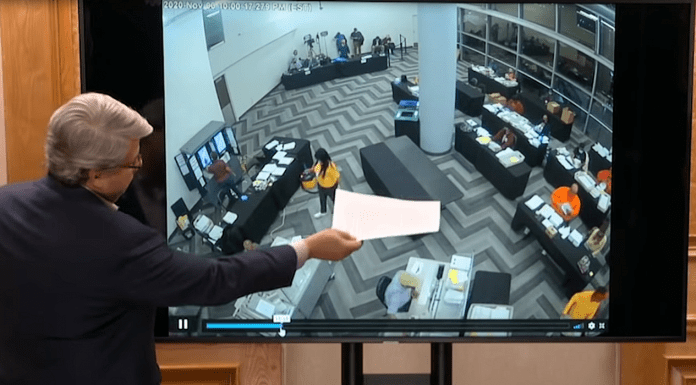(Joshua Paladino, Headline USA) The Georgia Supreme Court ordered that lower courts hear two 2020 election lawsuits that they had previously dismissed for lack of “standing,” the Georgia Record reported.
The high court reversed the lower-court ruling for Caroline Jeffords v. Fulton County, in which nine Georgia plaintiffs allege voter fraud in the state’s most populated county, which contains Atlanta.
The plaintiffs in Jeffords had asked the court to unseal 147,000 absentee ballots so they could review them for signs of fraud, the Associated Press reported.
The ruling, they said, also applied to at least one other case that had been dismissed by the appeals court on the premise that the plaintiffs were not directly impacted by any negligence or malfeasance on the part of state and local election officials.
Of the 92 total court cases nationwide that were brought by the Trump campaign and other concerned parties surrounding the stolen 2020 election, more than two-thirds were dismissed on technicalities—with lack of standing being among the most frequently cited.
Of the 30 decided on their merits, Trump and his allies were victorious 22 times (73%), debuking the false but widely spread narrative that the allegations were devoid of merit.
The Georgia Supreme Court said the ruling also applied to Garland Favorito v. Alex Wan, which the Georgia Court of Appeals dismissed because its “claims of vote dilution did not allege particularized injuries.”
To the appeals court, an entire state’s loss of representation in the presidency due to fraud in a single corrupt city did not constitute a specific injury, but if a minority were denied the vote, then the injury would be sufficient to proceed to trial.
“For example, in the racial gerrymandering and malapportionment contexts, vote dilution occurs when voters are harmed compared to irrationally favored voters from other districts,” the appeals court reasoned.
“By contrast, no single voter is specifically disadvantaged if a vote is counted improperly, even if the error might have a mathematical impact on the final tally and thus on the proportional effect of every vote,” it said.
The high court told the appeals court to reconsider the cases with Sons of Confederate Veterans v. Henry County Board of Commissioners in mind because the lawsuit set a standard for defining a “community stakeholder.”
If the appeals court hears the case on its merits, then the plaintiffs could have an opportunity for discovery, which may allow them to examine absentee ballots.
In light of Dinesh D’Souza’s 2,000 Mules—a documentary that focused on illegal ballot harvesting in the 2020 election, particularly in Georgia and other swing states—the investigation could reveal coordinated fraud.
Letters are being sent instructing Fulton County to preserve its ballots.

